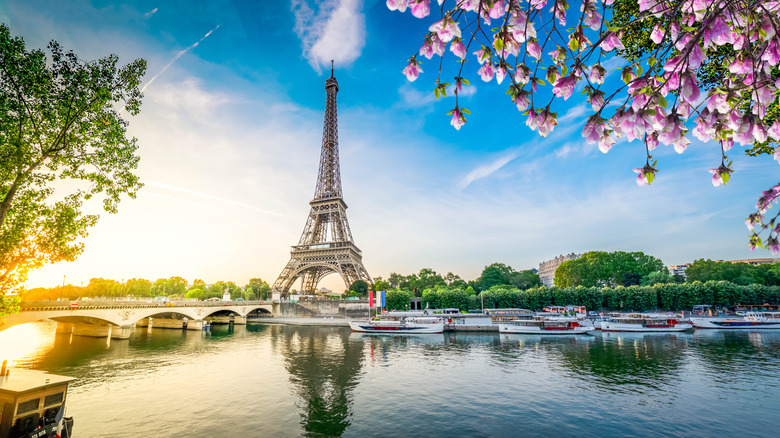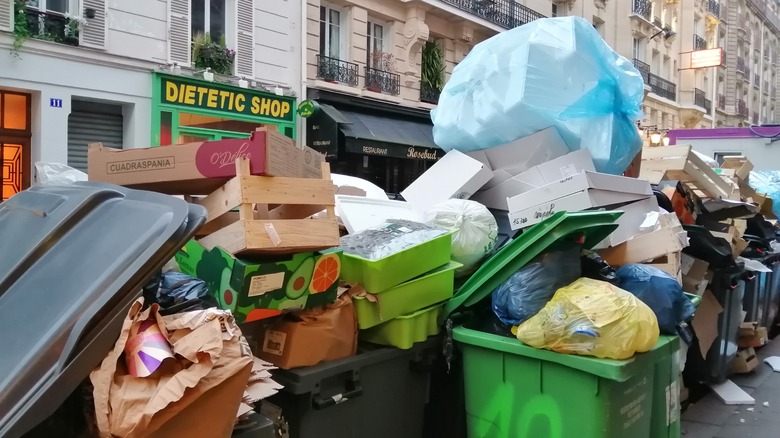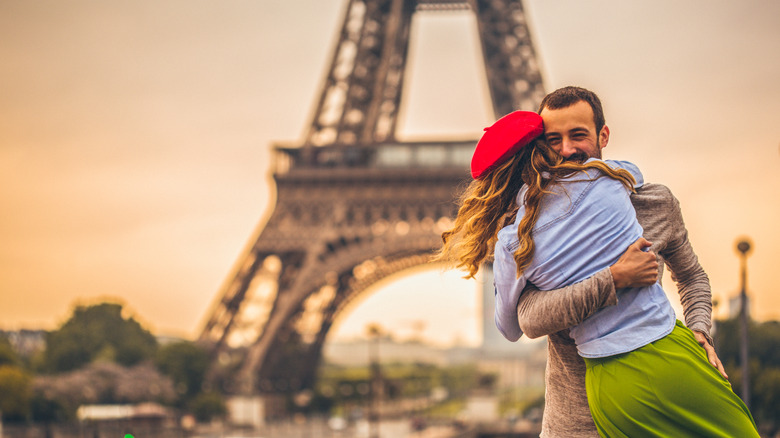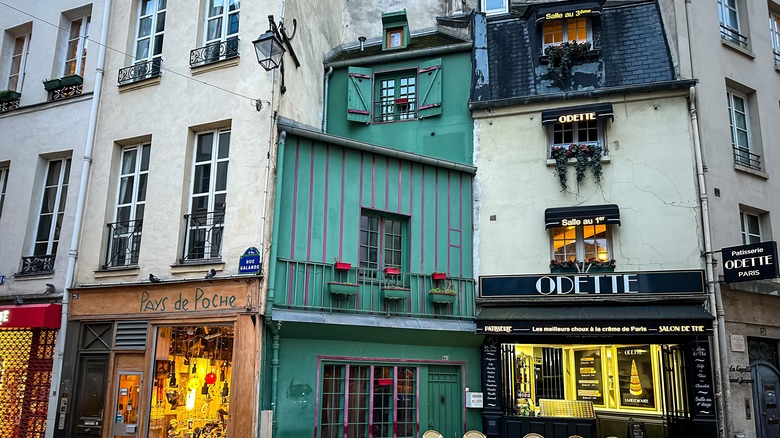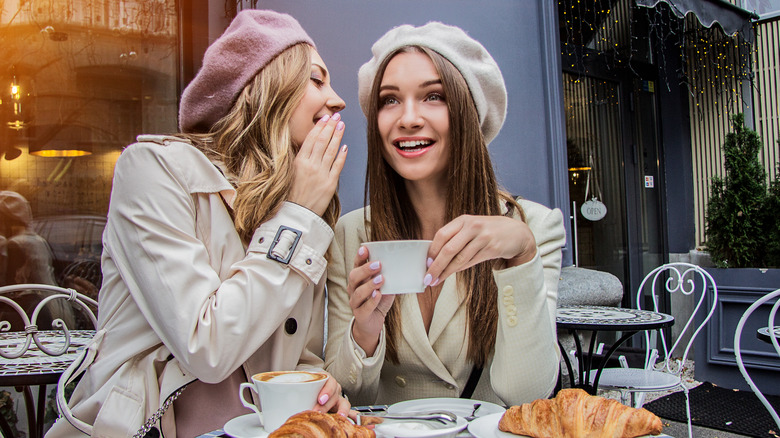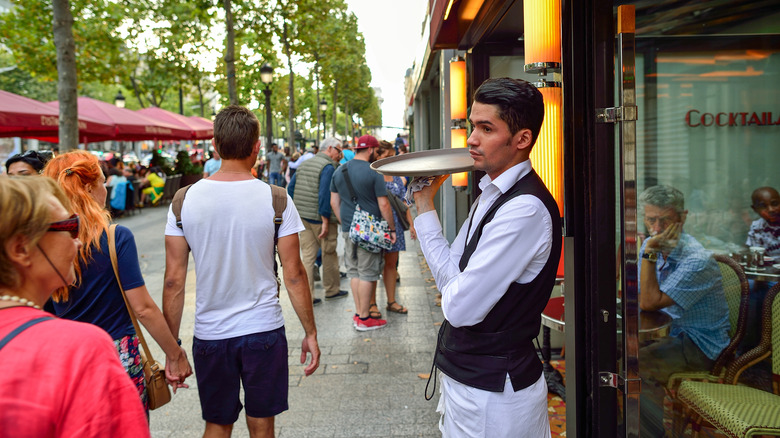The Biggest Things Hollywood Gets Wrong About Visiting Paris
Hollywood has offered a distinctive and romanticized picture of Paris for decades. From the 1957 classic film "Funny Face" to the modern-day TV series "Emily in Paris," Hollywood has played a big role in creating alluring visions of France's capital. While the suspension of disbelief is integral to any viewing experience, unseen realities about Paris can come as a surprise to those who haven't visited the dynamic city in person.
As it turns out, there's a plausible reason why some productions embellish certain features or alter Paris' realities. "For the most part, American directors paint their depictions of Paris and its culture through either nostalgic or rose-colored glasses," Alice Craven, professor in film studies at The American University of Paris, told BBC. "Audiences, particularly American ones, want to relish the beauty of the City of Lights and therefore welcome the misty tints given to the city by these directors."
However, an incomplete narrative about Paris could lead visitors to become disillusioned and experience the bizarre 'Paris Syndrome' while on vacation. Even minor surprises like a sweet-treat tourist trap may confound travelers. Contrary to Hollywood's fictional worlds, Paris isn't a one-note city of storybook romance and perpetual beauty. Let's unpack some of the most common misconceptions prevalent in Hollywood's portrayals of Paris.
Paris is dirtier than expected
Through stunning scenic shots of Paris, many Hollywood films and TV shows have given viewers a magnificent glimpse of the city's beauty. While Paris does contain glorious attractions such as the Pont Alexandre III arch bridge, murky waters lurk beneath the surface — literally. The Pont Alexandre III traverses the River Seine, which is widely known to contain untreated wastewater. Due to high pollution levels, swimming has been prohibited there since 1923. But since 2018, France has been cleaning up the famous landmark, investing $1.5 billion to revamp the city's sewage system and depollute the river, according to NBC News.
Overall, Paris has received unfavorable attention for its uncleanliness in recent years. In 2019, The Guardian detailed how piles of litter — cigarette butts, dog waste, beer cans — were cluttering the city. Resident Ruth Grosrichard, a professor and community activist, told the outlet, "I've traveled to many other cities in Europe and elsewhere and Paris is definitely the dirtiest." The garbage situation was made worse when pension strikes in March 2023, which included the participation of garbage collectors, caused tons of trash buildup on streets (via BBC). On X, formerly known as Twitter, one user compared these rat-infested conditions to a popular TV show's portrayal of the city, tweeting, "Far cry from 'Emily in Paris,' more like 'Ratatouille' in Paris." But the streets are cleaner since the strike ended, and hey, even "Ratatouille" made Paris look beautiful.
Paris isn't just a land of idealized romance
Paris' status as the "City of Love" has been reinforced by countless romantic Hollywood films and TV shows. For instance, viewers may recall Carrie and Mr. Big's sentimental reunion and kiss in "Sex and the City." Through sappy storylines and dreamy scenes, it's only natural to think of Paris as the capital of idealized romance. In a YouTube video by STUFR – Travel & Food, a local shared their views about this generalization, saying, "I don't think [Parisians are] romantic. I think it's a cliché about Paris because Paris [is] La Ville Lumière," referring to its nickname the City of Light. Another native conveyed her disappointment in a different clip for the short-video series, saying, "Men are not very romantic. They're not used to it. I think they should be more romantic. They should make more small gestures." Like any other place, there are a range of attitudes and approaches to relationships here.
Romantic movies and TV shows set in Paris (and elsewhere) often highlight picture-perfect, grand displays of love. Yet, in reality, many locals are uninterested in mainstream romance clichés. In a 2020 video for news network "France 24," a reporter asked several Parisians about their thoughts on Valentine's Day. "I don't like it when the celebration becomes commercialized," one woman said. The reporter noted that just "a third of French couples say they celebrate Valentine's Day on February 14th." Love takes many shapes in Paris.
Diversity and cultural clichés in Paris
Since its 2020 debut, "Emily in Paris" has taken heat for its portrayal of Paris. The Netflix television series focuses on a young American woman's adventures living in the city, and among the show's discrepancies, a purported lack of diversity has ruffled Parisian viewers. In 2022, native Alexandra Milhat told NBC News, "Paris is not just about the Louvre, Saint Germain, and the Tuileries gardens. Paris has very diverse neighborhoods with different cultures." She additionally commented on the show's lack of representation, saying, "Even when she walks down the street, there's not one Arab, Black, or Asian person in the background, it's only white people. To me, this is not Paris."
In a 2020 interview with Cosmopolitan, "Emily in Paris" star Lucas Bravo responded to feedback about the show's narrow depiction of the metropolis. "We're portraying cliches and we're portraying one single vision of Paris," the French actor acknowledged. "Paris is one of the most diverse cities in the world." Yet, Bravo admitted that the show's focus on a specific angle of Paris is a key part of the storytelling. At a 2022 series activation event (via Today), series actor Samuel Arnold spoke to the ongoing criticism about the show's capture of Parisian stereotypes like cigarette smoking. Arnold said, "I don't think ['Emily in Paris'] should have the pressure to depict down to a tee the city or the way that certain people behave and stuff like that."
Paris fashion isn't all so glamorous
Movies like "The Devil Wears Prada" and "Funny Face" showcase the glamorous side of Paris fashion. "Funny Face," which stars Audrey Hepburn as a burgeoning supermodel, has been recognized for its beautiful custom-designed Givenchy gowns, but such Old Hollywood styles aren't the norm. Paris-based designer Zoé Vya told Byrdie, "When people talk about French fashion, everyone has this image of the super chic Parisian woman with a beret and red lipstick — but when you go to Paris, it's obvious that no one dresses like that apart from tourists." She expanded on the city's racial and ethnic diversity and range of styles, adding, "There isn't a single type of Parisian woman."
In a 2023 TikTok video, an American woman living in Paris shared her firsthand discoveries about standard attire. While she said you'll "get looks" wearing laid-back clothes like sweatpants when you're out and about, she noted that formal dress is uncommon for nightlife. "Ladies, if you're going out in Paris, wearing a short skirt and heels or just being overly dolled up, you're gonna get some looks." According to her, there are exceptions at particular clubs, "but that's the minority," she said. From her experience, a typical going-out outfit consists of jeans and a top, along with boots, sneakers, or flat shoes.
Parisians aren't rude for no reason
Numerous Hollywood films and TV shows play up Paris' reputation as an unfriendly city, perpetuating the stereotype that Parisians are rude. However, many outsiders may be unaware of the larger cultural context surrounding such perceived off-putting behavior. In a video for "France 24," two hosts examined how French etiquette impacts this stereotype: "It's pretty paradoxical because they are quite obsessed with etiquette and savoir-vivre — living and behaving the right way."
Take, for instance, traditionally greeting employees at public places like shops and cafes. The host explained, "You can't just say 'excuse me.' You have to say 'bonjour' or the person might get offended and seriously ignore you." In addition, a polite greeting applies to casual situations like asking for directions or joining people in an elevator. Bonjour is one of the five essential phrases Rick Steves says tourists should learn before a trip to France.
On the other hand, many people disagree that Parisians are rude. In 2024, The Guardian published responses from readers, both visitors and residents, who shared their observations and experiences regarding the stereotype. "Simply saying 'Bonjour' instead of 'Hello' can make a difference," one reader wrote. "I know a few phrases of guidebook French and seeing me make the effort seems to soften people's attitudes." Others attributed an increase in friendly communications from the French to generational shifts and feeling more comfortable with speaking English. All in all, Paris is a multi-faceted city that's far more nuanced than Hollywood's countless illustrations.
